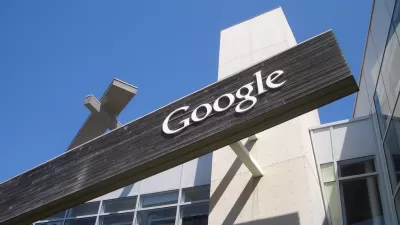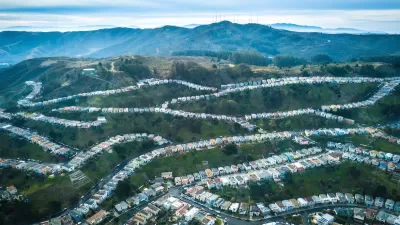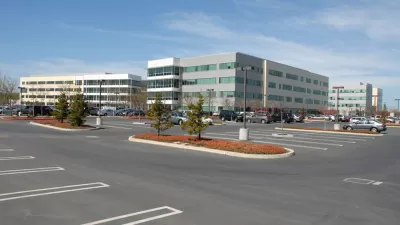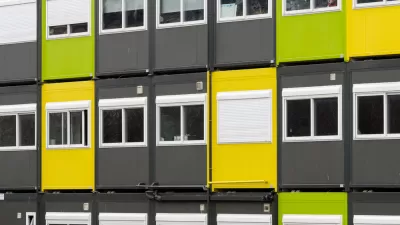Silicon Valley isn't just an industry. It's also a place. Actually, a series of places. The dozen or so cities that make up the valley are increasingly wary of the corporate behemoths that are constantly expanding within their city limits.

While tech lives in the cloud, the people and companies that fuel the tech economy still go to offices every day in real cities. Any city would kill to host the headquarters of Google, right? Sort of.
While Google has surely increased real estate values in its home city of Mountain View, Calif., and made the city more vibrant, local residents and public officials are becoming increasingly less accommodating, especially now that the company has plans to expand and radically redevelop its campus. Tension between the cities of Silicon Valley—which include Palo Alto, Santa Clara, and Cupertino, among others—and the tech giants that call them home have been on the rise.
Increasingly, cities have been forcing companies to provide community benefits, codified in community benefits agreements (CBA's), in order to win approval of their respective city councils. Community benefits can include everything from parks to road-widening to schools to just about anything else a city might want from a deep-pocketed neighbor. Apple's new 2.8-million-square-foot headquarters was approved in 2013 only with major strings attached, to the tune of $100 million. The Mountain View City Council recently rejected an agreement with Google. Google offered the small city $240 million in community benefits; the council balked, approving a project one-quarter the size that Google wanted.
Meanwhile, smaller companies, such as LinkedIn, seem to be having more success as cities try to diversify and not get overwhelmed by their major employers.
"The relationship between a giant, global corporation and a tiny municipality is a strange one, unbalanced and yet in many ways symbiotic. Tech companies are not colonizing cities against their will. Cities need tech money; and tech needs city support — especially as more companies buy more property all over Silicon Valley, planning for greater growth. The result is a redefining of local public-private partnership. Where cities once ran on tax dollars, selective corporate philanthropy has emerged as a significant driving force of urban policy."
"While companies have always engaged in lightweight local philanthropy — donating to schools, sponsoring Little League teams — these new arrangements operate at a different scale. Not a barbecue for public safety, but a new public safety building; not a computer lab for an elementary school, but a computer for every student in every school in the district. And while corporate giving has always been about burnishing local reputations, in Silicon Valley it’s also about living up to a lofty brand identity that espouses certain social values and cultural mores."
"The political climate for tech companies in the Bay Area is, to a great extent, confused. The Googles of the world are blamed for a sharp rise in the cost of living and an increased strain on public services and infrastructure, but at the same time, no one can deny the huge boost they’ve given local government coffers."
FULL STORY: Why One Silicon Valley City Said “No” to Google

Depopulation Patterns Get Weird
A recent ranking of “declining” cities heavily features some of the most expensive cities in the country — including New York City and a half-dozen in the San Francisco Bay Area.

California Exodus: Population Drops Below 39 Million
Never mind the 40 million that demographers predicted the Golden State would reach by 2018. The state's population dipped below 39 million to 38.965 million last July, according to Census data released in March, the lowest since 2015.

Chicago to Turn High-Rise Offices into Housing
Four commercial buildings in the Chicago Loop have been approved for redevelopment into housing in a bid to revitalize the city’s downtown post-pandemic.

Google Maps Introduces New Transit, EV Features
It will now be easier to find electric car charging stations and transit options.

Ohio Lawmakers Propose Incentivizing Housing Production
A proposed bill would take a carrot approach to stimulating housing production through a grant program that would reward cities that implement pro-housing policies.

Chicago Awarded $2M Reconnecting Communities Grant
Community advocates say the city’s plan may not do enough to reverse the negative impacts of a major expressway.
City of Costa Mesa
Licking County
Barrett Planning Group LLC
HUD's Office of Policy Development and Research
Mpact Transit + Community
HUD's Office of Policy Development and Research
City of Universal City TX
ULI Northwest Arkansas
Town of Zionsville
Urban Design for Planners 1: Software Tools
This six-course series explores essential urban design concepts using open source software and equips planners with the tools they need to participate fully in the urban design process.
Planning for Universal Design
Learn the tools for implementing Universal Design in planning regulations.

























